It Takes Two: Up Close with Librarians Margaux DelGuidice and Rose Luna
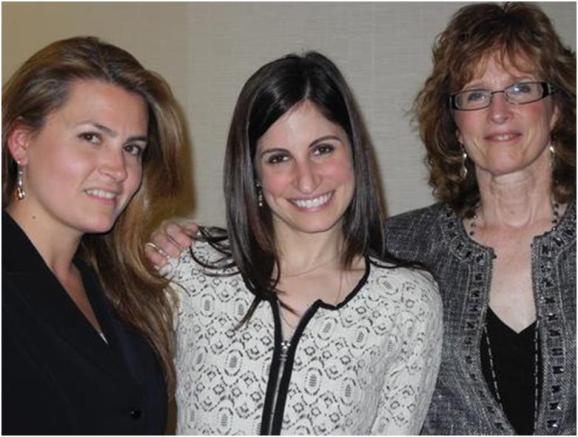
Rose and Margaux with Sara Kelly Johns at the NYLA SSL 2012 conference, after presenting a session together with Sara on advocating for your libraries by making a community connection.
In addition to their part-time positions at Freeport Memorial—where DelGuidice is a youth services librarian and Luna is a bilingual reference librarian—these two powerhouses of the profession also hold full-time teacher librarian positions at Garden City High School and Freeport High School, respectively. Since meeting in 2004 at a monthly meeting for school district librarians, the two have become close collaborators in their efforts to advocate for school libraries and for the public library in their community, and, more recently, to take their advocacy to the national stage through conference presentations, free webinars for their colleagues, and continued professional development. In this ninth of a dozen planned interviews with the youth services librarians named as Movers & Shakers this year, DelGuidice and Luna share their inspirations and passions, their best practices for constructive collaboration, and their goals for the future of library advocacy. How did you know that librarianship would be a good fit for you? Margaux: Growing up I spent every free moment of my weekends and summers at the library. In college, I used to cut the classes to hole up in the library and read for hours on end. The library has always been a comforting place for me and continues to welcome and nurture me like the supportive arms of a best friend. After following my friends down a career path into the business world I realized that corporate America was not the place for me. I needed a job that had substance and soul, where my work would really help others and make a difference. Rose: I have always been involved with and drawn back to the library…I actually attended my first ALA conference in NYC as a child, with my cousin, Mary Oppman. Mary was an amazing, pioneering librarian who exuded energy and excitement about the positive difference libraries could make in the world. I was also in the library club in fifth and sixth grade and my first job in high school was a page at our public library. While I was in college studying opera I was placed in a work study program in the college library. But I wasn't convinced that I could be myself and be happy in a lifelong library career until I attended a REFORMA conference in Austin, TX. The REFORMA librarians were the coolest librarians I had ever met. They welcomed me, introduced me to people, and made me feel right at home.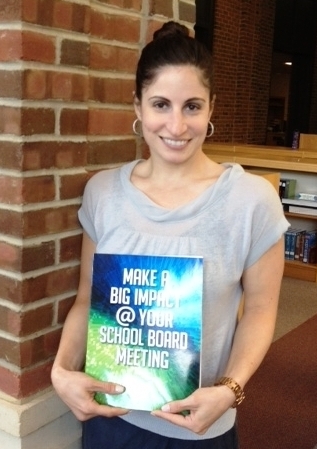
Margaux holds a copy of her book with Rose, Make A Big Impact @ Your School Board Meeting, in her school library.
How do you take advantage of your dual positions to serve the kids in your community? Margaux: One of the first things I did at Garden City High School was to reach out to the young adult librarian at the public library. Four years later, that same librarian has become a good friend and ally, as we fight for students to have the access they need to succeed in high school and beyond. This past October, she reached out to me and [my colleague] Lois Kuster to present at a joint Summit on the Common Core at the Garden City Public Library. This event never would have happened if there was not an organic and natural collaborative relationship in place between the two institutions. Rose: I am better able to help our students and staff access information between both locations. I am also able to share school projects with the public librarians and share with our students and staff the great resources for them to use from the public library and online. It makes collaborating much easier. We have provided all incoming 9th grade students with library orientations—the public librarians come to our high school and make sure students have a public library card and recognize a familiar face so they are comfortable going to the public library. I can assist the public librarians in feeling comfortable at the high school and give them tips for presenting that information to our school.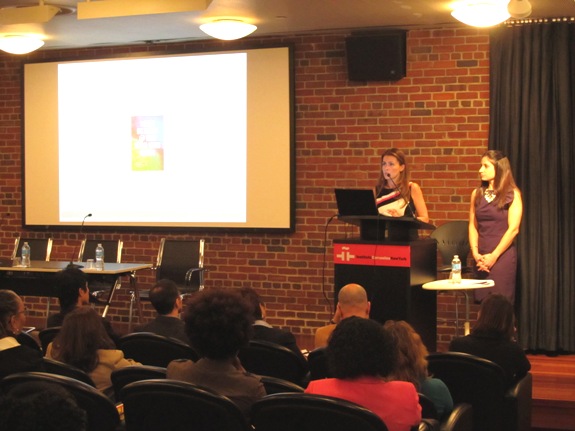
Margaux and Rose deliver the keynote presentation at a recent joint conference at the Cervantes Institute in NYC. The conference was organized by REFORMA,s Northeast chapter.
What is a typical day or week like for you at your respective schools? Margaux: I’m always juggling something; there is always meaningful work to be done. Each day brings new opportunities to make my role and my library visible: A teacher to collaborate with, a student to conference with on a paper, a research project to pull and create resources for, a college student’s paper to edit and an information literacy lesson to teach. On an average day, nearly half of the school passes through the physical walls of my library and numerous others connect via 24/7 access to our online resources. For a school that houses only 1150 students we have an astounding number of students that use the library on a daily basis. During the 2012–2013 school year we had over 12,000 students use the library during study halls and senior “off” periods and over 35,000 students sign-in to the library during their lunch periods, that is more people than the population of my town! Rose: My high school has approximately 2000 students and on any given month we have 3500 to 4000 walk-ins plus another 1500 to 2500 for scheduled classes. So from the moment I walk into my library, I'm bombarded by requests and I must be able to deftly switch between the competing priorities. One minute I may be helping a student with a research project and the next setting up a temporary lab space with laptops for a full class lesson on our online databases. In order to meet the needs of our students I have taken the time to train library interns with running the circulation desk and clerical tasks while I teach. After school, I stay to keep the library open for students through a 21st Century grant. This has been a very successful program that really seems to help students complete their work and improve their level of overall achievement. At the public library, I also conduct an adult Spanish book club, called Grupo de Conversación de Libros Latinos, with native and non-native Spanish speakers.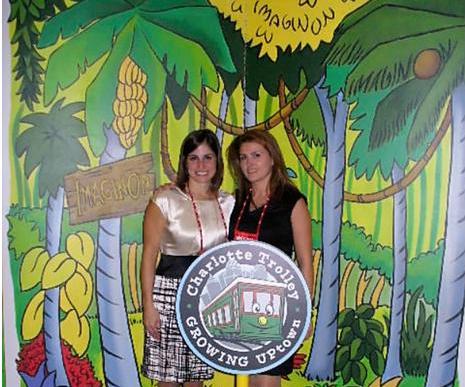
Margaux and Rose at "ImaginOn," the closing celebration at AASL's conference in Charlotte, VA, in 2009, after presenting a concurrent session on advocacy.
How have you shaped programming over the years to reach your communities? Rose: Prior to working in the school district I worked as an outreach librarian at Freeport. We had a lot of great programs, but I felt we needed to diversify them. Not everyone is interested in classical music, so I suggested we get a Mariachi group, gospel, etc. We also began to offer classes on the Internet in Spanish. We now have many wonderful programs due to the contributions of many people at the library. We also just had our first Spanish Language Resource Fair, which I collaborated on by connecting with our school district to bring in student performers and alumni. I even sang bilingual children’s songs to entertain children and their parents. Margaux: Garden City High School is in a very exciting place right now. We have planned activities that help students combine their love of all things digital with reading for pleasure and self-expression. The purchase of 25 Nook eReaders has added to our programming options as we now have a Nook Book Club that consists of both students and teachers. When there is a high profile title that students are clamoring to read (like The Hunger Games) we meet as a group to discuss and debate. We have been fortunate to have some very gifted authors pass through our school [but] this year, the loss of instructional time due to Superstorm Sandy halted our options to host a big author assembly. We opted for an informal author chat and writing workshop hosted by Jen Calonita in the library after school. The coziness of that intimate meeting has remained with the students long after her visit. What are each of you most proud of at Freeport? At your schools? Margaux: I am so proud of the role that the library plays in this diverse community, my hometown. The entire village of Freeport was decimated by Superstorm Sandy, yet when I showed up to work two nights after the storm, the library was open, alive and buzzing. It was the literal calm in the middle of the storm. Additionally, the library has a truly wonderful, collaborative relationship in place with all of the K–12 schools and school librarians in the district. The school district librarians and many of the public librarians maintain constant communication. This type of an open relationship is unfortunately rare in the library world, yet it truly works to serve the students in this diverse community. At Garden City High School, I am extremely proud of the work that we have been doing to teach research and information literacy skills using content from almost every area of the high school curriculum. Rose: I am most proud of the progress we made in our school over the years. The library at the high school used to be closed often for various meetings and testing, but over the years we have communicated the importance of the library to our administrators. The library is now rarely used for testing or administrative meetings. The students get upset if we close! Our library has become an important place for research and collaboration. Can you tell us more about your webinar series and your presentations? Margaux and Rose: After presenting at three national conferences, giving one national preconference presentation and speaking at numerous state and local library associations on how to successfully advocate for your library position and program, we recognized that there was a need to reach even more librarians on this important topic. Webinars are a great way to reach librarians that cannot afford to travel or do not have the time to leave their jobs or homes for days at a time. We worked with the team at EasyBib and used their platform and contacts to give our first webinar and share our tools, tips and tactics. Since then we are working with Follett Software to give webinars on advocacy and the Common Core, and with other local BOCES organizations. We also know how important it is to reach those that are in a leadership position as administrators in school buildings and districts across the country.. we have plans to bring these advocacy webinars on the link between certified school librarians and student achievement directly to those key decision makers.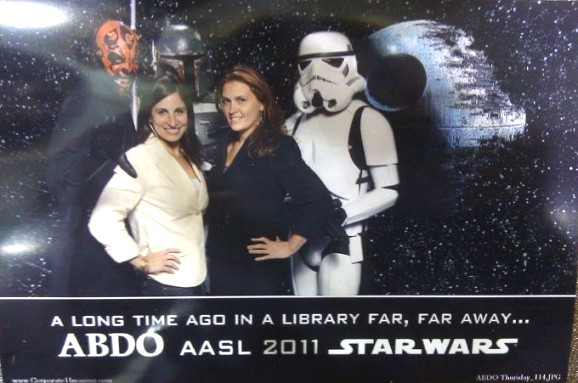
Margaux and Rose after presenting at a pre-conference session at AASL 2011 in Minneapolis, MN.
Do you have any advice for librarians seeking to improve outreach in their communities? Margaux and Rose: You need to love what you do and have it show when you communicate with others. It is the one-on-one contact that makes the difference. A flyer or a newsletter will never be enough to draw people in without that personal touch. I find when doing outreach that so many do not realize all that great services provided by school and public libraries. We need to make people aware of the amazing resources available to them. It is important, as a school and public librarian, to make sure that you are getting out there and actually showing people. There have been many occasions where we have volunteered our personal time during the evening, and on weekends, to conduct outreach by speaking at community group meetings, or running programs. The benefits will be the payoff in the long run. What are the big issues and challenges for youth services right now? Margaux and Rose: Of course funding and public support are always the two biggest challenges to any library program, but I think it especially is important with regard to the support for youth library services and youth services programming. There is a misconception out there that just because children, tweens and teens can login to Facebook, or check their e-mail on a smartphone that they no longer need information literacy guidance or educational instruction. School librarians and youth services librarians are needed now, more than ever, to guide our students and patrons to be good digital citizens and to teach them how to effectively analyze, assess and utilize all forms of information. We are both also frustrated by the pervasive amount of filtering that happens in schools, along with the policies in many school districts that do not allow students to use mobile devices for learning in the classroom. As librarians we are always looking to work with administrators to find feasible ways to rectify these situations. [For example, Margaux was recently appointed to a district-wide technology committee that is looking to address Social Media and BYOD policies and other technological issues.] What do you think youth services should look like going forward? Margaux and Rose: Youth services need to constantly adapt to the changing needs of our younger patrons to remain relevant in an increasingly digital society. For example, delineations between “Children’s Rooms” and “Young Adult/Teen Areas” are so important. Young adults need to know that they have their own physical, and virtual, space at the library and that they will be respected for their unique ideas and perspectives as they move towards finding their way into the adult world. A teen might come off the street and into the library because he heard that Friday night was XBOX Gaming Night and then may (as a result of this exposure), pick up a new book to read, gain some new acquaintances, and check out some of the other programs the library has to offer. Youth services should be the portal for tweens and teens into a safe world where they are able to express themselves, learn about new technologies, explore their hobbies and connect with others.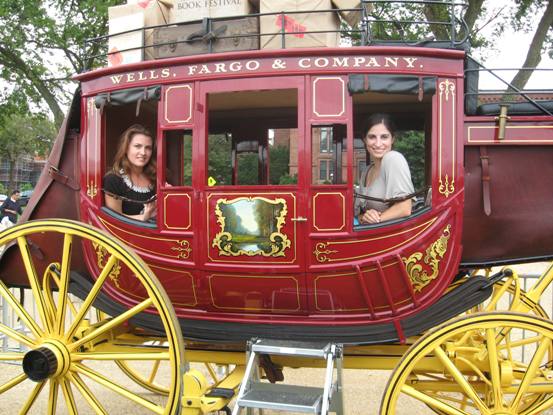
Rose and Margaux take a time-out at the 2011 Book Festival in Washington, D.C., after attending the 2011 School Library Journal Leadership Summit in Arlington, VA.
What’s on your career wish list? What would you love to do that you haven’t done yet? Margaux: My dream is to write a New York Times bestseller, live off of the royalties, and pursue a career as a personal trainer or yoga instructor. However, if that does not work out, I think there may be a doctoral degree somewhere in my future. I currently work as an adjunct professor of academic writing and research; however I have always longed to educate aspiring teacher librarians and public librarians by teaching full time on the university level while also pursuing my other dream of writing. I am an active member of SCBWI and have had some creative short stories published I hope that in the future I will be able to carve out even more time to devote to writing a novel. Rose: A personal goal on my checklist is to put together a cabaret vocal performance at a venue in NYC, such as Don’t Tell Mama’s. I have taken cabaret performance classes with the 2013 MAC Award Winner for Major Duo-Barbara Fasano and Eric Comstock. I want to focus on improving my technology expertise and continue to help others integrate technology. On my wish list is attending ISTE, which I am very excited to be attending for the first time in June. I look forward to continuing to advocate for libraries, especially by communicating our message to administrators. We may do a webinar for School Leadership 2.0 in the near future. What are the best professional development experiences that you have ever had? Margaux: Mentors have always helped to pave a successful path for me and I have learned by their examples. I have been very fortunate to have some fabulous mentors over the years from my district provided mentor at my very first school library job (thanks Nancy!), to Sara Kelly Johns, who was my mentor when I was chosen as a GALE/Cengage SLJ "New Leader" back in 2010. In 2011, I was a selected to be a member of the ALA "Future Perfect" Task Force. Through that appointment I was able to learn from the committee chair Brett Bonfield on how to make big changes happen in a meaningful and impactful way. And of course Rose, who has been my unofficial mentor since that first district librarian’s meeting all those years ago. Rose: I took an incredible course called “School Leadership and Human Relations Skills for the Proactive School Library Media Specialist” with Michael Keany, who is now the co-founder of Leadership 2.0, a site dedicated to providing/sharing the best practices in school leadership. This course played an essential role in my taking increased initiatives in advocating for school and public libraries and strategically thinking about the way I could gain a seat at the decision-making table. I have also followed Joyce Valenza’s blog for years and have learned so much from her. I feel as if she is a virtual mentor and more recently I have also presented with Sara Kelly Johns. Singing in cabaret classes has also helped with presenting—another form of performing.RELATED
The job outlook in 2030: Librarians will be in demand
The job outlook in 2030: Librarians will be in demand
ALREADY A SUBSCRIBER? LOG IN
We are currently offering this content for free. Sign up now to activate your personal profile, where you can save articles for future viewing






Add Comment :-
Comment Policy:
Comment should not be empty !!!
LibrarianNy
Amazing what these two have been able to do despite a NY states financial difficulties. Could not figure out if these two had families of their own. If they did I can't imagine how they would have the time!Posted : May 18, 2013 06:14
Rhoda Geoghegan
Wonderful article . It is very exciting to hear what these librarians are doing. The libraries are true learning bridges with schools and communities. We are privileged to have such enthusiastic and creative librarians.Posted : May 18, 2013 09:38